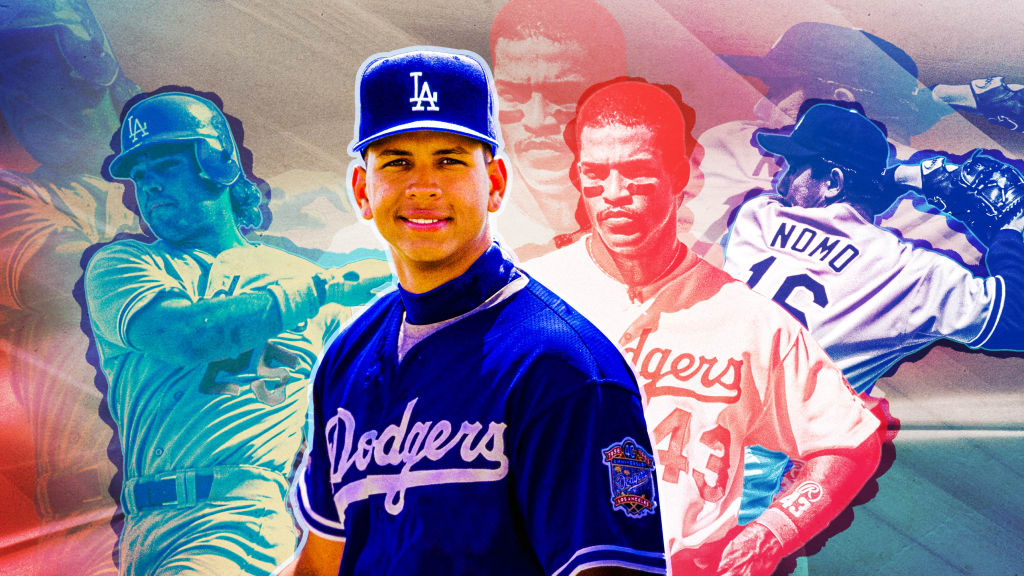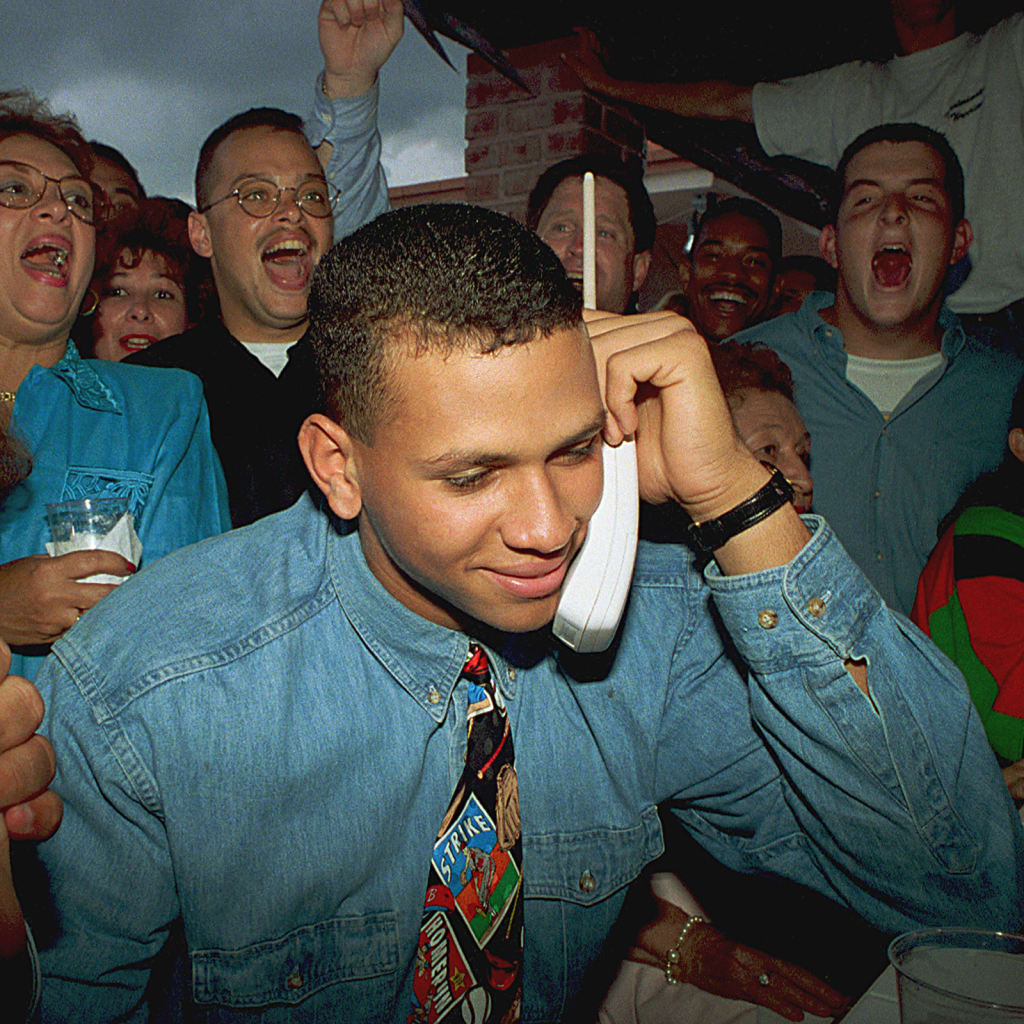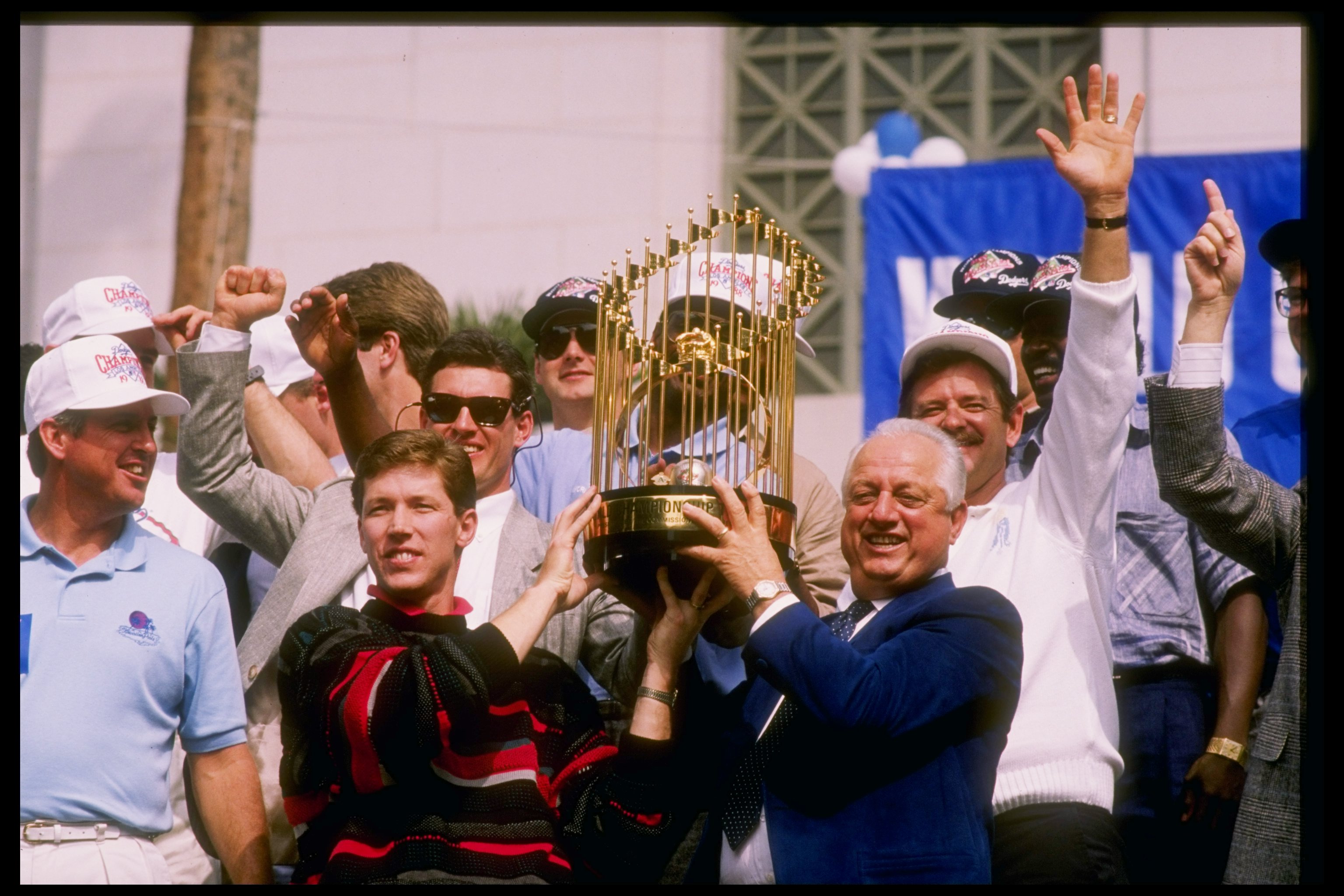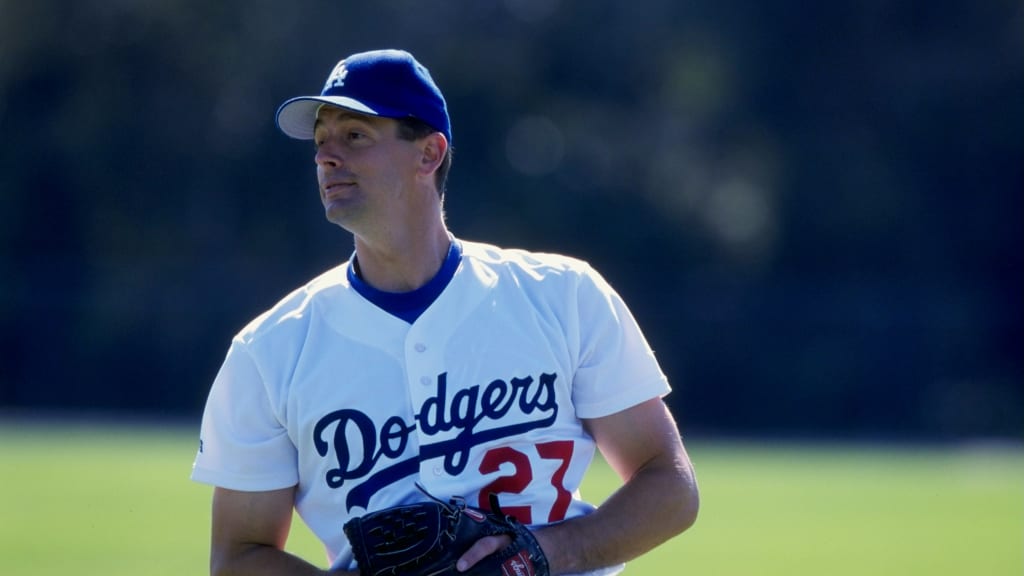
A version of this story was originally published in June 2020.
Los Angeles is the home to stars. Movie stars. Sports stars. Sports stars that want to be movie stars. So, it’s a little shocking that Alex Rodriguez -- president of A-Rod Corp, ESPN broadcaster and ex-fiancé to Jennifer Lopez -- has never called the Hollywood Hills his home. A shortstop with a brilliant smile and a seemingly limitless desire to be loved by the populace? Yeah, A-Rod was made for the Dodgers.
If not for an MLB Draft rule that no longer exists, he would have been.
Los Angeles finished the 1992 season with the worst record in the Majors, so, if the 1993 MLB Draft were to happen today, the Dodgers would have the first pick. Instead, as Stephen Nesbitt at The Athletic highlighted in 2020, the top Draft pick alternated between the American and National Leagues each year. Despite the Mariners winning one more game than the Dodgers the previous season, they got to choose first.
The rest is history:
The Mariners selected Alex Rodriguez, while the Dodgers picked Darren Dreifort. Dreifort was a fine player, one whose career was cut short by injury, but he was no transcendent superstar.

But what if that rule weren’t in place? What if the Dodgers were the ones to pick first? Today, we’ll travel to this alternate dimension and see what would have happened had A-Rod wound up in Dodger Blue.
1. The Dodgers become the coolest team of all time
Just think: Not only does this put Rodriguez -- arguably the greatest shortstop of all time -- in Los Angeles with the first overall pick, but it pairs him with arguably the greatest catcher in Mike Piazza, himself a 62nd-round Draft pick in 1988.
While we'll talk about A-Rod's impact on the field in a moment, it's important to mention how the Dodgers could simply steamroll all of pop culture with this roster. You thought Benny "The Jet" Rodriguez wearing a Dodgers cap in "The Sandlot" turned a lot of people into Dodgers fans? That's nothing compared to this team loaded with young, international star power who are playing in one of the largest media markets and are surrounded by film and television crews.
Just think: Rodriguez at short, Piazza behind the dish, Hideo Nomo and his tornado windup on the mound, and the young, chock-full-of-tools Raul Mondesi in right field. There’s Eric Karros at first base -- a 30-home run hitter with the kind of hair that belongs in a soap opera, not the ballfield.
This is the '90s and baseball is the king of pop culture -- look at all the commercials Piazza shot alone for proof of that -- but now add A-Rod to the mix?
The Dodgers would be a merchandising machine. Forget covers of magazines, does this get them their own Saturday morning cartoon, like ProStars? A film franchise? An interconnected film-television-and-nascent streaming service at the turn of the millennium? OK, maybe that's hyperbole, but it doesn't seem impossible.
2. The Dodgers become the Yankees of the National League
If you thought this past decade's Dodgers teams were good, this group could have been even better.
Here are the Dodgers' real-life finishes between 1995-2000 -- the years that A-Rod was in Seattle, while L.A. trotted out Jose Offerman, Greg Gagne, Jose Vizcaino, Mark Grudzielanek and Alex Cora at short:
1995: 1st place in NL West, swept in Division Series
1996: 1 game back in NL West, won the Wild Card and were swept in the Division Series
1997: 2 GB in NL West, 4 GB of Wild Card
1998: 15 GB in NL West, 7 GB of Wild Card
1999: 23 GB in NL West, 20 GB of Wild Card
2000: 11 GB in NL West, 8 GB of Wild Card
Replace the Dodgers' shortstops with Rodriguez, and just by doing the incredibly clumsy step of adding his WAR to the club, the Dodgers become the 1996 and '97 NL West Division champions and likely NL Wild Card winners in 1998 and 2000.
Better seeding, more postseason appearances and A-Rod in the lineup? Yeah, this Dodgers team is absolutely terrifying.
Because A-Rod helps the Dodgers win the division in '96, they go on to play the Cardinals in the first round instead of the Braves. Though St. Louis swept the Padres in the real world, in this universe they lose to the Dodgers in five games, as the additional offensive firepower -- combined with the best pitching staff in baseball (at least, as far as ERA is concerned) -- is enough for L.A. to advance to the NLCS.
Unfortunately, even in this universe, I’m not foolish enough to say that the Dodgers can get past the Braves.
But in 1997? Well ...
3. The Dodgers win the 1997 World Series
Apologies to the Marlins, because in this universe, the Dodgers win it all -- at least, if every Marlins pitcher doesn’t get a Livan Hernandez strike zone.
With Rodriguez on the roster in place of Greg Gagne (.652 OPS), the Dodgers pass the Giants and win the NL West. In the NLDS, Los Angeles defeats the Marlins in five games, as Florida’s group of stars can’t beat Piazza and Rodriguez.
L.A. would then emerge victorious in its rematch against the Braves in the NLCS, setting it up to face Cleveland in the World Series.
It's a huge story when Orel Hershiser -- the Dodgers’ 1988 World Series MVP -- comes out to pitch against his old team, but just like in our world, the veteran pitcher struggles in his two outings.

The Dodgers take the World Series, and for a brief time it’s Ramon Martinez who is a bigger star than his brother, Pedro, as he plays a big part in securing the title for L.A.
4. Randy Johnson now becomes a Dodger
Unfortunately, the World Series victory isn’t enough to keep Piazza in L.A. The star catcher was traded in our reality after an impasse developed between Piazza and ownership over a contract dispute, and once that rift opened, the Dodgers' front office didn’t believe it would be able to close it.
In this universe, the trade still goes down as the Dodgers are even less worried about what happens if they trade their generational backstop because they've got Rodriguez at short.
However, because the Dodgers were still a competitive club, they decide to make a massive trade that will have major benefits in a few short years.
Before the Mariners dealt Johnson to Houston, the Dodgers had an offer on the table to the Mariners for the Big Unit. The deal -- rumored to be Ismael Valdez and Wilton Guerrero in exchange for Johnson -- came with a June 2 deadline from Dodgers GM Fred Claire. Though the Mariners were below .500 and in third place on that date, it was too early for Seattle to throw in the towel on the season, and so they let the deadline lapse with the intention of keeping Johnson through the season.
But, as the Mariners went into an 8-20 tailspin in June, they reversed course and dealt Johnson to the Astros at the Trade Deadline. After that, the lanky lefty went on an absolute tear (10-1, 1.28 ERA).
Things are a bit different now. Without A-Rod in the lineup, the Mariners can’t delude themselves into thinking the postseason is a possibility. Plus, in this exercise, Seattle has 26-year-old Darren Dreifort, who is in the midst of his first full year in the rotation. The Mariners still have high hopes for the future of the No. 2 overall Draft pick and think that he can front the staff for years to come. That makes Johnson expendable.
They do ask the Dodgers to sweeten the pot a little. Because L.A. doesn’t need to acquire Grudzielanek from the Expos to play shortstop, the Dodgers are able to add Ted Lilly -- then a 22-year-old starter in Double-A -- to the package featuring Valdez and Guerrero. That's enough to get the Mariners to say yes to the deal. (Because nothing happens without it ending poorly for the Mariners, we should note that this deal means the team doesn't have Freddy Garcia and Carlos Guillen, who both played significant roles on the 116-win 2001 club.)
Though this wouldn’t mean much in '98, the Dodgers -- who were connected to Johnson multiple times as a possible trade or free-agent target over the years -- decide to sign the pitcher who has already been with the team before the '99 season.
That means Johnson stays in L.A. and, with Johnson and A-Rod, the Dodgers nip the Mets for the NL Wild Card in 2000. It erases a Subway Series that October, as New York and Los Angeles now battle for coastal supremacy. Unfortunately for the Dodgers, the pitching is far too thin behind Johnson and the Yankees emerge victorious.
As for the D-backs?
5. Kevin Brown signs with Arizona
The D-backs made a big move for their future when they signed Johnson following the 1998 season. With Johnson joining the Dodgers in this world, Arizona knows it is in a literal arms race in the NL West and it ponies up the cash to sign Brown.

This doesn’t impact the D-backs much in the standings in '99 and 2000. Both Brown and Johnson are healthy and among the best pitchers in the game.
However, it will prove crushing in 2001. That year, Johnson and Curt Schilling became characters in a tall tale as they almost single-handedly (double-handedly?) pushed the D-backs to the franchise's lone World Series title. Unfortunately, Brown missed most of the 2001 season with an injury. While he was able to return in September, there is no way he would be able to handle the kind of workload that Johnson did in October -- pitching two complete games and coming out of the bullpen to seal victories.
So, who wins the 2001 World Series? Great question. For that ...
6. A-Rod signs a record contract with the Mets in 2001
OK, so hear me out on this one. In the real world, the Rangers shocked everyone when they signed Rodriguez to a $252 million deal, with the Mets and Red Sox making big plays for the star but coming up short. The Dodgers were expected to be major players, but never made a serious offer.
Now, the Dodgers still don't make a move to keep the star they drafted, and after losing the Wild Card the year before, the Mets go over the top and do whatever it takes to sign Rodriguez. A-Rod himself wishes he had signed with the Mets -- well, now it happens.
That not only means that we have a reunion with Piazza, but with A-Rod slotted in at shortstop instead of Rey Ordóñez, the Mets make up the six-game NL East deficit and they snap Atlanta’s streak of NL East titles five years earlier than they actually did.
With a relatively weak National League playoff field, the Mets are able to make up for their thin pitching staff and outfield, and run their way to the World Series to face the Yankees ... where they lose once again. A-Rod can't fix everything.
There's one final and very big change coming ...
7. Alex Rodriguez is traded to the Red Sox
After the 2001 season, both the real-life and alternate reality versions of the Mets hit a rough patch. With top prospect José Reyes on his way up to the big leagues, the Mets do like the Rangers did, and trade A-Rod before the 2004 season. The difference is that this time, there's no chance they deal him across town to the Yankees -- depriving us of the delicious soap-opera battle we created in our minds between Derek Jeter and A-Rod.
That leaves only one option among teams with interest and the cash to pull off the deal: the Red Sox.
In our reality, that trade nearly happened until Rodriguez's plan to forfeit salary in exchange for his image rights and other concessions ended up nixing the deal. With the Yankees out of the running, Boston has more time to figure out how to make it work.
The deal -- with the Mets replacing the Rangers in a three-team trade with the White Sox -- would have looked like this:
Mets get: Manny Ramirez, Jon Lester, cash
Red Sox get: Alex Rodriguez, Magglio Ordonez, Brandon McCarthy
White Sox get: Nomar Garciaparra, Scott Williamson
Yeah, this deal basically blows up baseball and gives us very little solid ground to still stand on.
Sure, the Red Sox are a better team, so they probably don't go down 3-0 in the ALCS against the Yankees that fall, but without Ramirez, they probably don't defeat the Yankees and go on to win the World Series, either. So much had to happen so perfectly -- yes, Rodriguez is a better shortstop than Orlando Cabrera, but Cabrera was a pivotal part of that World Series team -- that I don't think it happens. And without Ramirez or Lester, do the Red Sox win the 2007 World Series? And if they don't win that championship, what happens to the two World Series teams from this decade?
Garciaparra would have been an upgrade at shortstop over Juan Uribe for the White Sox, so does Chicago still win the 2005 World Series? That one certainly seems more likely than Scott Podsednik hitting a walk-off home run, and the the trophy stays on the South Side.
For Mets fans, there is one more moment that you can erase from your memory: With Ramirez in the outfield, the team wins the 2006 NLCS, and Carlos Beltrán never goes down looking against Adam Wainwright.
And to think, this truly unhinged reality, one that seems so remarkably different from ours, all happened because the Dodgers picked first.
